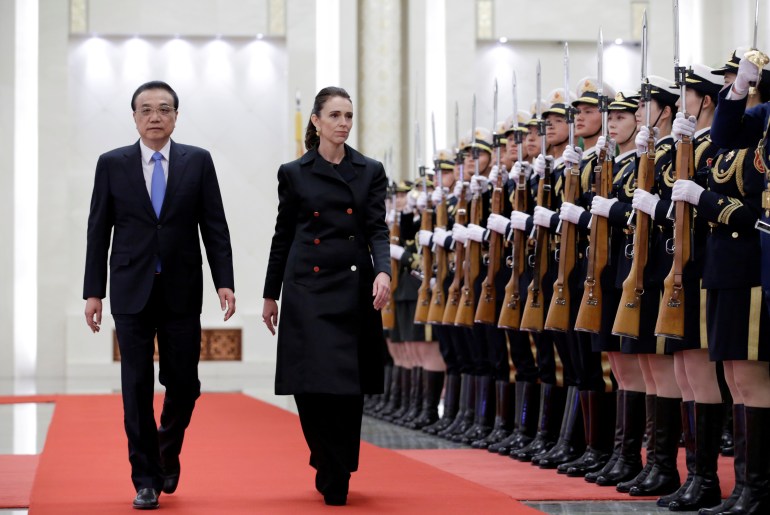[ad_1]
Following US trade war, China has signed several trade and investment deals to bolster its multilateral credentials.
China and New Zealand have signed a deal that upgrades their existing free trade pact, giving exports from the Pacific nation greater access to the world’s second-largest economy.
New Zealand Prime Minister Jacinda Ardern confirmed the signing on Tuesday of an expanded trade deal with China, noting its significance amid the coronavirus pandemic.
The agreement comes as Beijing seeks to establish itself as a strong advocate of multilateralism following a bruising trade war with the United States and as the coronavirus keeps international borders closed.
“China remains one of our most important trade partners … For this to take place during the global economic crisis brought about by COVID-19 makes it particularly important,” Ardern said at a news conference.
The agreement expands an existing trade deal with China and ensures it remains fit for purpose for another 10 years, New Zealand trade minister Damien O’Connor said in a statement.
Under the new deal, tariffs for many of New Zealand’s mostly commodities-based exports, which include dairy, timber and seafood, will be either removed or cut. Compliance costs will also be reduced.
The deal also includes commitments by both sides to promote environmental protection and not lower standards to gain a trade or investment advantage.
China’s multilateral push
Following years of pressure from the administration of former US President Donald Trump over trade and, more recently, international scrutiny over the handling of the coronavirus, China has emerged as a surprising champion of globalisation and multilateralism.
In recent months, Beijing signed an investment pact with the European Union and joined the world’s largest free trade bloc in the 15-country Regional Comprehensive Economic Partnership (RCEP), which also includes New Zealand.
China has also expressed interest in joining the Comprehensive and Progressive Trans-Pacific Partnership (CPTPP) Agreement, the successor to an earlier pact from which Washington withdrew.
Speaking at a virtual meeting of the World Economic Forum on Monday, President Xi Jinping criticised isolationism and “Cold War” thinking and called for barriers to trade, investment and technological exchange to be removed.
Under its new deal with Wellington, China will also open up sectors such as aviation, education and finance. In exchange, New Zealand will increase visa quotas for Chinese language teachers and tour guides, China’s official Xinhua news agency reported on Tuesday.
New Zealand was the first developed country to sign a free trade agreement with China in 2008 and has long been touted by Beijing as an exemplar of Western engagement.
 China’s Premier Li Keqiang (left) welcomed New Zealand Prime Minister Jacinda Ardern (right) to the Great Hall of the People in Beijing on April 1, 2019 [File: Jason Lee/Reuters]
China’s Premier Li Keqiang (left) welcomed New Zealand Prime Minister Jacinda Ardern (right) to the Great Hall of the People in Beijing on April 1, 2019 [File: Jason Lee/Reuters]
China is now New Zealand’s largest trading partner, with annual two-way trade of more than 32 billion New Zealand dollars ($21.58bn).
But ties have been tested under Ardern’s government as New Zealand criticised China’s influence on small Pacific islands and raised human rights concerns about Muslim Uighurs. Ardern also backed Taiwan’s participation at the World Health Organization (WHO) despite a warning from Beijing.
The trade pact with New Zealand also comes as Beijing’s ties with neighbouring Australia worsened after Canberra called for an independent investigation into the origins of the coronavirus pandemic, which was first reported in central China.
Australia has appealed to the World Trade Organization to review China’s decision to impose hefty tariffs on imports of Australian barley.
New Zealand, which will host the regional Asia Pacific Economic Cooperation summit this year, has said it would be willing to help negotiate a truce between China and Australia.
[ad_2]
Source link











